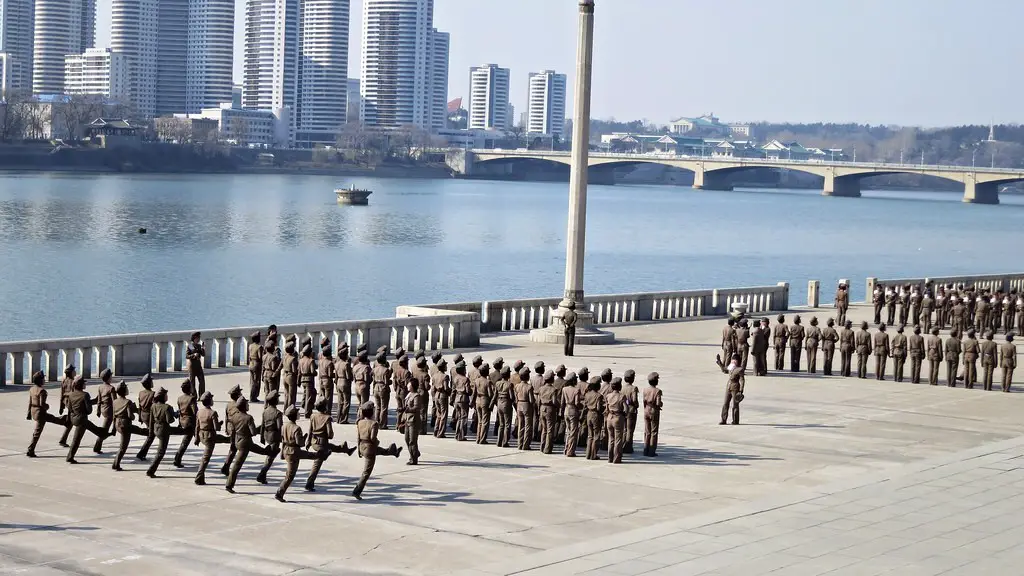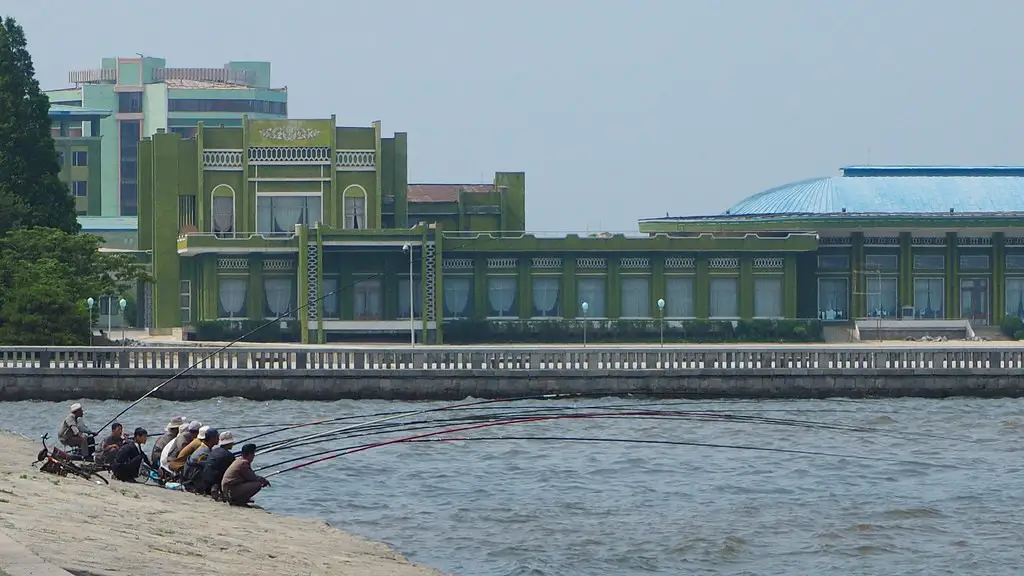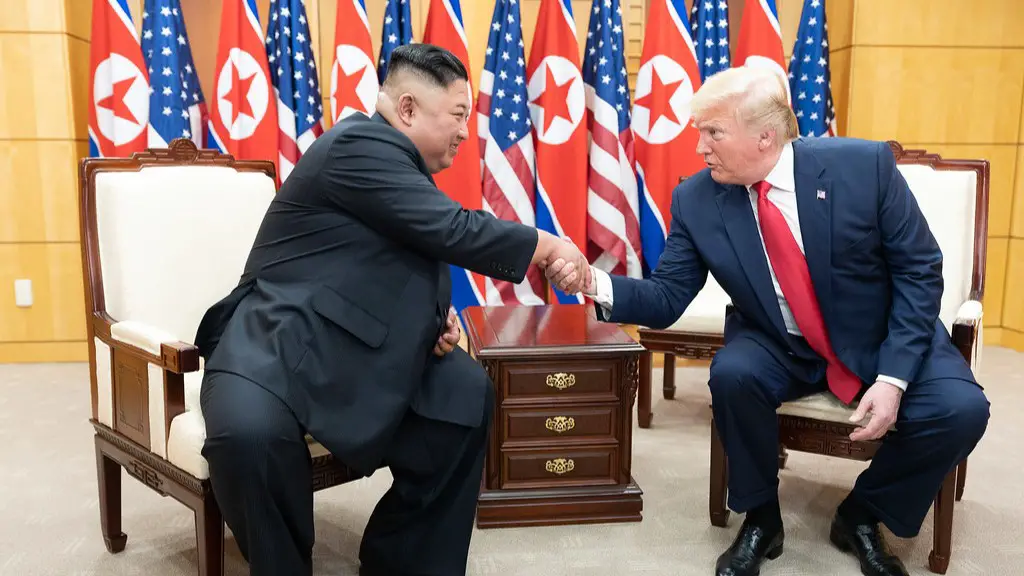For years now, North Korea has been trying to build one of the most destructive nuclear weapon arsenals in the world. This has been a source of tension between North Korea and the United States. In fact, the latest bout of tension came in the summer of 2019 when North Korea tested a medium-range ballistic missile and threatened to “mercilessly destroy” the United States. So, why does North Korea want to attack the United States?
One explanation is that it may be part of North Korea’s long-term strategy to establish itself as a legitimate, global power. Through its nuclear activities, North Korea is trying to gain diplomatic leverage and legitimacy. To do this, North Korea must be seen by the international community as a nuclear power capable of defending itself. By threatening the United States, North Korea is attempting to demonstrate its nuclear prowess and gain the respect of the international community.
Another possible explanation for why North Korea wishes to attack the United States is that it is seeking revenge for past offenses. After the Korean War, the United States placed a number of economic sanctions on North Korea. This has had a massive impact on the economy of North Korea, which is already struggling due to its authoritarian government. For North Korea, this could be seen as an act of retaliation for past injustices.
In addition, North Korea wants to use the threat of a nuclear attack as a way to prevent the United States from intervening in North Korean affairs. North Korea has long viewed the United States as a threat to its security, and by threatening the United States with a nuclear attack, North Korea hopes to deter the United States from intervening in North Korean affairs.
Finally, North Korea may be using the threat of a nuclear attack as a way to pressure the United States into concessions. North Korea has long been at odds with the United States over its human rights record, and North Korea has expressed interest in gaining US recognition and normalizing relations with the US. By threatening the United States with a nuclear attack, North Korea is hoping to pressure the United States into offering concessions and eventually normalizing relations.
What Could be Gained from the Bombing?
It is unknown what North Korea would gain from attacking the United States. Some experts speculate that North Korea could potentially gain a greater sense of legitimacy in the international community. North Korea wants to be viewed as a powerful global player and an attack on the United States could potentially give North Korea more recognition and respect. Additionally, North Korea could also use the attack as a way to pressure the United States into giving it what it wants, such as the removal of economic sanctions. In short, attacking the United States could potentially be a way for North Korea to get what it wants from the United States.
However, it should be noted that attacking the United States would make North Korea even more of an international pariah, which could ultimately hinder North Korea’s ambitions of becoming a global power. Furthermore, it could result in a military conflict with the United States, which could be devastating for North Korea. North Korea may have the capacity to carry out a nuclear attack against the United States, but it would cost the country greatly in terms of lives and resources.
Prevention and Protection
The United States has responded to North Korea’s threats by engaging in a diplomatic effort to try to prevent North Korea from carrying out an attack. The United States has entered into negotiations with North Korea to try to find a peaceful resolution to the conflict. The United States has also stepped up its military presence in the region in order to deter North Korea from carrying out any acts of aggression. In addition, the United States has increased its missile defense capabilities in order to protect itself from a possible North Korean attack.
The United Nations has also taken steps to try to prevent North Korea from attacking the United States. The United Nations has imposed a variety of economic sanctions on North Korea, which are meant to increase pressure on the country to halt its nuclear weapons development and end its threats to the United States. Additionally, the United Nations has sent envoys to North Korea in an effort to persuade it to abandon its nuclear ambitions.
Can We Reach a Compromise?
Ultimately, it is difficult to say whether North Korea will or will not carry out an attack against the United States. There are a number of factors at play, such as North Korea’s interest in gaining international legitimacy, its desire for revenge against the United States, and its desire to pressure the United States into making concessions. These are all potential motives for North Korea to carry out a nuclear attack against the United States. However, there is still a chance that the United States and North Korea could reach an agreement that could avert the possibility of an attack. In the end, only time will tell.
The Impact of a Bombing
If a nuclear attack were to occur, it would likely have devastating consequences for both North Korea and the United States. The military and economic losses for both countries would be immense and the psychological trauma for the citizens of both countries would be immense. This is a scenario that must be avoided at all costs. In addition, the political implications of a nuclear attack could be far-reaching and unpredictable.
Most importantly, a nuclear attack would have consequences for the entire world. A nuclear attack between two major powers would only heighten tensions in an already volatile region, and could potentially lead to a larger-scale conflict. The implications of such a conflict are too grave to contemplate.
Comparing with Past Bombings
It is important to note that North Korea is not the first country to threaten the United States with a nuclear attack. During the Cold War, both the United States and the Soviet Union threatened each other with atomic bombs. Fortunately, both sides eventually agreed on a peaceful resolution, and the world averted a nuclear war. History has shown, however, that nuclear threats can never be taken lightly and must be dealt with immediately.
In conclusion, it is clear that North Korea wishes to attack the United States for a variety of reasons. The motives for doing so, however, are still unclear. What is clear is that a nuclear attack on the United States would have devastating consequences for both countries, as well as for the international community. The United States and the international community must find a way to de-escalate the current tension and reach a peaceful resolution.
What are the International Responses?
The international community has responded to the crisis by attempting to negotiate with North Korea and by imposing economic sanctions. In addition, military forces have been deployed to the region and international organizations such as the United Nations have been tasked with trying to broker a peace between the United States and North Korea. While these efforts have been somewhat successful in preventing a nuclear attack, it is still important for the United States to be vigilant and prepare for the worst.
However, it is also important to note that not all countries in the international community are supportive of the United States. In particular, some countries such as Russia and China have expressed sympathy for North Korea. While these countries have not taken direct steps to support North Korea, they have expressed a desire to see the United States come to a peaceful agreement with North Korea.
It is also important to note that some countries have taken proactive steps to prevent a nuclear attack. In particular, some countries have offered to host peace talks between North Korea and the United States. These countries have offered to play a mediating role between the two countries in an attempt to find a peaceful resolution to the current crisis.
What is the American Perspective?
The United States views North Korea’s nuclear ambitions as an unacceptable threat that must be neutralized. The United States government has been firm in its stance that North Korea must abandon its nuclear weapons program and cease its threats against the United States. The United States has also expressed a willingness to pursue diplomatic solutions to the crisis, but it has also made it clear that it is prepared to take military action should North Korea continue its nuclear activities.
The United States has also taken steps to increase its defensive capabilities in order to protect itself from a possible North Korean attack. The United States has increased its missile defense systems and has enhanced its intelligence gathering capabilities in the region. In addition, the United States has also increased the presence of its military forces in the region in order to deter North Korea from carrying out an attack.
In conclusion, the United States views North Korea’s nuclear ambitions as an unacceptable threat that must be neutralized. The United States has made it clear that it will not tolerate North Korea’s nuclear weapons development, and that it is willing to take steps to defend itself should North Korea carry out an attack. At the same time, the United States is also attempting to pursue diplomatic solutions to the crisis and is looking for ways to de-escalate the current tension.
Negotiations and Repercussions
It is evident that in order to find a peaceful resolution to the crisis, negotiations between the United States and North Korea must take place. In order for negotiations to be successful, both parties must be willing to make concessions. The United States must be willing to offer economic aid and make steps toward normalizing diplomatic relations with North Korea, while North Korea must be willing to abandon its nuclear weapons program and refrain from making further threats against the United States.
If the negotiations are successful, it is possible that the international community could see a decrease in tension and a return to a more peaceful situation. However, it is difficult to predict the long-term repercussions of a nuclear attack should it occur. Regardless of the outcome, it is clear that the stakes are high and the consequences of a nuclear attack could be catastrophic.





